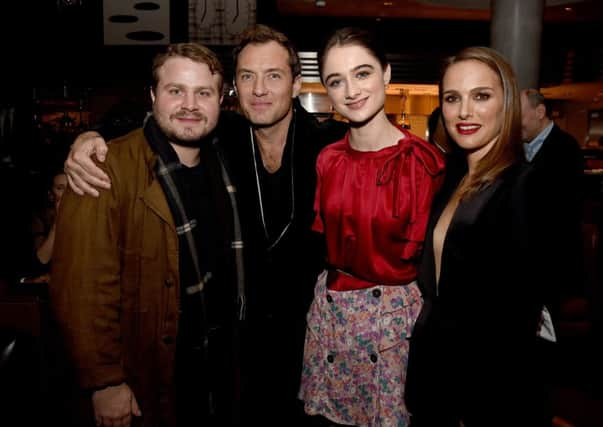Vox Lux director Brady Corbet: “The line between fame and infamy has become really, really blurred”


“It seemed like a major turning point in the culture,” says Brady Corbet. The actor-turned-filmmaker is referring to his decision to begin his second feature, Vox Lux, with a Columbine-style high school massacre.
The film itself is something of a state-of-the-nation-style meditation on the anxieties of the 21st century digital age – a wild, pop music-infused odyssey starring Natalie Portman and Jude Law. But in setting the prologue in 1999, the film invokes the massacre of 12 students and one teacher by two Columbine high school seniors on 20 April of that year as the moment things all changed. “It was the new face of terror,” says Corbet.
Advertisement
Hide AdWhen I speak to Corbet, it’s just two days before the 20th anniversary of Columbine. It’s also the day that an 18-year-old Florida woman, said to have been obsessed with the massacre, is found dead in the mountains west of Denver from a self-inflicted gunshot wound. A few days earlier she had forced the closure of local schools – Columbine among them – after authorities became concerned that she might be on some kind of armed pilgrimage to the school. Clearly, then, the shooting still exerts a terrible hold on the collective psyche of the country.


Corbet, who grew up in Colorado a couple of hours’ drive from Columbine, thinks it’s a significant event for anyone around his age. “I was in elementary school when it happened,” says the 30-year-old. “I think anyone who was in elementary, middle school or high school was really rocked by that event because it did become more commonplace. It really left a major mark on my childhood.
“Now I have a daughter of my own and she participates in school shooting drills the way that I used to have fire drills when I was a kid. It’s something that has become very much a part of American life.”
Indeed, one only need check out Bo Burnham’s new film Eighth Grade to see the extent to which such drills have been normalised. In one of the funniest and most disturbing scenes in his coming-of-age comedy drama, his 13-year-old protagonists are pretty blasé about such drills, too distracted by what’s on their phones or what’s happening with their hormones to pay much attention to the military tactician with a replica gun giving them survival tips.
“It’s just part of their everyday life,” says Burnham, 28. “We just tried to put the white noise of their lives in the background of whatever they’re struggling with. It’s typical kid stuff and what’s happening in the background is a very hyper-violent, hyper-sexualised culture.”
Though Burnham doesn’t think this is all that different from how kids would have reacted during the duck-and-cover nuclear bomb drills that school kids in the 1950s endured, he does concede the whole process is scary and horrifying.
Advertisement
Hide Ad“Columbine happened when I was nine and the spectre of a really violent act happening was always a part of my school life.”
However, Corbet’s movie is more interested in looking at the bigger cultural picture. In line with new reporting standards, it doesn’t dwell on the perpetrators the way other films about mass killings have (such as Gus Van Sant’s Elephant, Lynne Ramsay’s We Need to Talk About Kevin, Tim Sutton’s Dark Night or the found-footage films Zero Hour and The Dirties). Instead it focuses on survivors, following the character of Celeste – played as a teenager by Raffey Cassidy and as an adult by Natalie Portman – as she emerges from the trauma of the school shooting that opens the movie to become a stadium-filling pop star of Britney Spears/Lady Gaga/Taylor Swift proportions – a superstar who, by the time we catch up with her in 2017, is on the comeback trail having gone spectacularly off the rails in the intervening years.
Advertisement
Hide AdFor Corbet, this merging of atrocity and its after-effects with pop stardom and celebrity was a natural way to reflect on first two decades of the 21st century.
“When people talk about the early part of the new century,” he says, “I think that they are going to talk about school shootings, terrorism, 9/11 and, in equal measure, they will talk about Britney Spears and Taylor Swift and the pop-cultural sphere. And the reason that these things seem to overlap as the most iconic events of the 21st century has a lot to do with the news cycle. So when you open up your Apple News Updates, you have a headline about Kim Kardashian alongside a headline about 50 people dead in New Zealand. That’s unique to this generation.”
Part of what the film is exploring is the modern day desire to be iconic and be remembered at any cost.
“The line between fame and infamy has become really, really blurred,” says Corbet, who attributes this to both the corporatisation of celebrity and the way the rise of social media has encouraged ordinary people to market themselves as brands. But he also thinks this has changed the way terrorist atrocities like mass shootings are being perpetrated.
If the 20th century was defined by what Hannah Arendt identified as “the banality of evil”, Corbet – who explored Arendt’s ideas in his directorial debut Childhood of a Leader – thinks the 21st century is about the “pageantry of evil”.
“Several weeks ago a man live-streamed himself shooting up a mosque,” he says, referencing the shooting in Christchurch in order to illustrate what he means by the phrase. “It’s basically about the desire to be seen as you commit an atrocious act of violence. There’s a desire to go out with a bang,” he continues. “The young man who dressed up as the Joker a few years ago and shot up a movie theatre in Aurora, Colorado – I find something very disturbing about the pageantry of that gesture.”
Advertisement
Hide AdCorbet is careful not to suggest Vox Lux has any solutions; it’s merely his way of trying to make sense of the age in which he’s living and working. His protagonist, for all her monstrous behaviour in the second half of the film, is really suffering from ongoing PTSD – much like the nation as a whole.
“I think it’s a post-traumatic generation,” he surmises. “And the anxiety for this generation, it’s off the charts. They’re glued to their phones. There’s a sense that anyone could drop dead at any moment because we constantly have news updates about people who, for better or worse, you previously had never even heard of, but we are suddenly a part of that tragedy. How do we resolve that? How do we decide what to take in and what not to take in?
Advertisement
Hide Ad“You can’t just grieve all the time; you have to do some living too and be present for your kids. So it’s complicated. I think we’re all learning how this all works and how to cope with the moment that we’re living in.” ■
Vox Lux is released on 3 May. Eighth Grade is in cinemas now